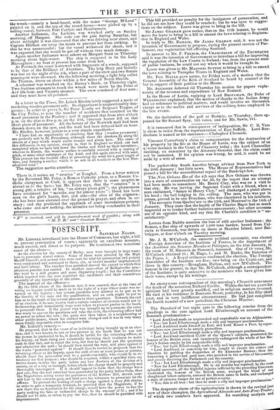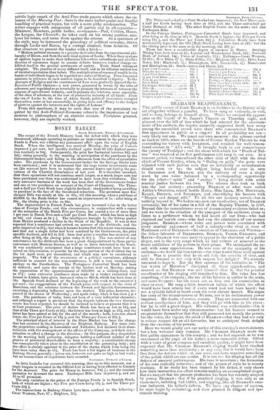The desperate alarm of the agriculturists is shown in the
revival just now of their champion, the Agricultural Advocate and Anti-Free-Trader ; of which two numbers have appeared. Its searching analysis and subtile logic smack of the Anti-Free-trade papers which adorn the co- lumns of the Morning Post : there is the same rather quaint and fanciful handling of practical topics, but with a more pithy condensation. The writer engages with antagonists of all parties and in all capacities— Ministers, Members, public bodies, newspapers—Peel, Cobden, Hume, the League, the Chronicle; he takes each on his strong position, ana- lyses his terms, and turns them against the utterer. As a specimen of the style, may be instanced the genealogy of political economy, drawn through Locke and Bacon, by a corrupt channel, from Aristotle. Of that structure we present the reader with a brick- " Modern political economy is a genuine derivative from the experimental phi- losophy of Bacon, and from the anti-ideal system of Locke. When these systems of opinion began to make their influences felt—when subordinate and satellite theories of commerce began to assume definite forms—a marked change ex- hibited itself in the general sentiments of society. Trade found vehement eulogists. The practice of usury diffused itself, and in its diffusion excited less of decided reprobation than before. The multiplication of masses of wealth in the hands of individuals began to be regarded as a national blessing. Time-honoured opinions in reference to such matters began to be described as bigotry. To the precepts of Religion and the enactments of Law were gradually opposed the in- fluences of Public Opinion—a new power, generated in towns by the tribe of schemers, and regulated so as invariably to promote the interests of towns at the expense of agricultural industry, and to promote the interests, more especially, of the class of schemers, at the cost of productive industry of all kinds. From the era of Locke to the time of Adam Smith, political economists occupied themselves, more or less successfully, in giving form and efficacy to the designs of plotters against the interests and the rights of Labour."
From this specimen, it may be seen that one of the postulates re- quired by this Anti-Political-Economy school is the imputation of bad motives to philosophers of an abstract science. Postulates granted, however, they are capitally worked.



























 Previous page
Previous page